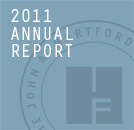If you have been following our blog series covering the 2011 Annual Report, then you know that our team has captured moving stories from older adults themselves who have benefited from the programs and services funded by the Hartford Foundation. I would like to highlight one such video about Patty, who has dementia but whose family observed a complete personality change in her after she fell and fractured her hip.
http://youtu.be/E7-JZ8q5Img
Delirium, for the inexperienced health care provider, is hard to differentiate from dementia. Patty was fortunate to have had Dr. Lalith-Kumar Solai, a psychiatrist from the University of Pittsburgh Center of Excellence in Geriatric Psychiatry, as her doctor. He adjusted Patty’s medications and was able to determine that Patty also had an untreated urinary tract infection. With antibiotics, the infection cleared and so did Patty’s delirium. The family was relieved to see their mother return to her usual calm and loving personality.
About a year ago, I wrote a blog about my father’s period of delirium he experienced after undergoing triple bypass surgery. It was astonishing to me that his physicians—and even his nurse wife—did not recognize his behavior as a consequence of delirium. I, as a trained geriatric social worker, knew and had to inform them.
 Because education and training in geriatrics is crucial in providing adequate and appropriate care to older people, the John A. Hartford Foundation has funded programs to do just that. Two of our programs are Centers of Excellence in Geriatric Psychiatry—one at the University of California, San Diego, and the other at the University of Pittsburgh. Both conduct research in geriatric mental health, develop curriculum, educate psychiatric fellows, and provide clinical psychiatric services to older adults. We are very proud of the work they are doing and have featured them in our 2011 Annual Report, which focuses on Geriatric Mental Health.
Because education and training in geriatrics is crucial in providing adequate and appropriate care to older people, the John A. Hartford Foundation has funded programs to do just that. Two of our programs are Centers of Excellence in Geriatric Psychiatry—one at the University of California, San Diego, and the other at the University of Pittsburgh. Both conduct research in geriatric mental health, develop curriculum, educate psychiatric fellows, and provide clinical psychiatric services to older adults. We are very proud of the work they are doing and have featured them in our 2011 Annual Report, which focuses on Geriatric Mental Health.
There are not enough geriatric psychiatrists in our country to meet the need now; and as our population ages, there will be many more older people who will need such services in the very near future. This is why the Hartford Foundation has supported two Centers of Excellence in Geriatric Psychiatry. Each of the centers support and train fellows and junior faculty who in turn teach and train other physicians in geriatric psychiatric competencies.
The Center of Excellence in Geriatric Psychiatry at the University of Pittsburgh’s Department of Psychiatry houses one of the nation’s largest divisions of geriatric psychiatry and trains 20 percent of the nation’s academic geriatric psychiatrists. It is directed by Charles E. Reynolds III, MD. And the Center of Excellence in Geriatric Psychiatry at the University of California, San Diego, Department of Psychiatry, has a track record of research focused on older adults with schizophrenia, bipolar disorders, and other psychotic disorders. It is directed by Dilip V. Jeste, MD. You can read more about their programs in the Research section of our 2011 Annual Report.
And just for the record, knowing about geriatric mental health issues and interventions is not just for physicians or psychiatrists. All health care providers need to have some basic knowledge in order to ensure that older people receive the appropriate care at the appropriate time.
Fortunately for Patty and those who love her, she had a doctor trained in geriatric mental health. Who knows what might have happened to my father if I had not recognized the symptoms of delirium and spoken up on his behalf?
